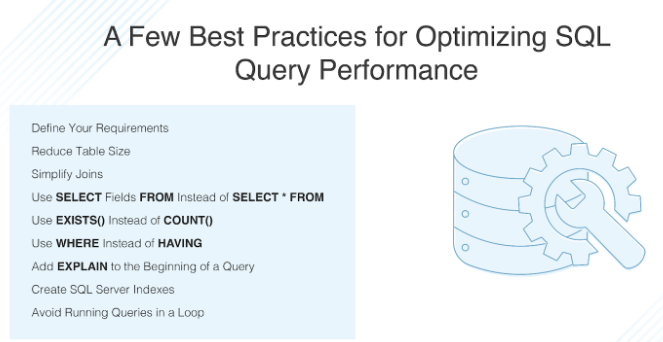
SQL Best Practices
- Use explicit column names: Instead of using the asterisk (*) to select all columns, explicitly specify the columns you need. This improves query performance and makes the query’s intent clearer.
- Avoid using SELECT DISTINCT unnecessarily: SELECT DISTINCT can be resource-intensive, especially on large tables. Only use it when necessary to eliminate duplicates.
- Use proper indexing: Indexes can significantly improve query performance. Identify the columns frequently used in WHERE, JOIN, and ORDER BY clauses, and create indexes on those columns.
- Avoid using SQL functions in WHERE clauses: Applying functions to columns in the WHERE clause can prevent the database engine from using indexes efficiently. Instead, try to restructure the query to use the column directly.
- Use JOINs instead of subqueries: JOIN operations are generally more efficient than subqueries. Use appropriate JOINs to combine data from multiple tables.
- Optimize query ordering: Arrange the conditions in the WHERE clause in the order that will eliminate the greatest number of rows first. This can help the database engine optimize the query execution plan.
- Limit the use of NULL values: NULL values can cause unexpected behavior in queries. Avoid using NULLs for primary keys and important columns unless necessary.
- Use parameterized queries or prepared statements: To prevent SQL injection attacks, use parameterized queries or prepared statements, which allow you to separate SQL code from user input.
- Properly handle transactions: Wrap a series of SQL statements in a transaction when necessary to ensure data consistency and integrity. Use the appropriate transaction isolation level based on your requirements.
- Regularly analysed and optimize queries: Monitor query performance and identify slow-running queries. Use tools like EXPLAIN or query profiling to understand the query execution plan and optimize as needed.
- Document your queries: Add comments to your queries to explain their purpose, assumptions, and any potential side effects. This helps with maintainability and allows others to understand the query’s intent.
- Test queries with representative data: Ensure that your queries perform well with realistic data volumes. Test them on different datasets to identify potential bottlenecks or performance issues.
StudySection provides a big list of certification exams through its online platform. The French Certification Exam can help you to certify your skills to communicate in the French language. Whether you are new to the language or you are an expert in it, this French certification exam can test the ability of anybody’s command over the French language.




